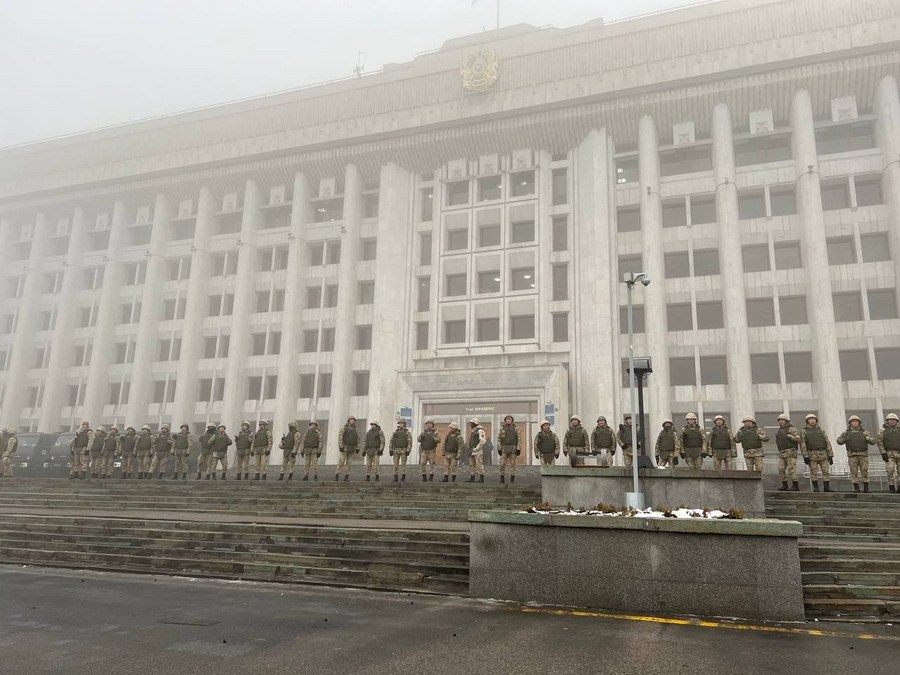Righting the Ship

With the restoring of order in Kazakhstan, economic issues and its people’s livelihood will become the government’s top priority. Cooperation with China will help the country address its most pressing development challenges.
Sparked by a fuel price hike on New Year’s Day, violent protests against the government erupted in Kazakhstan on January 2. The protests soon spread throughout the Central Asian nation. Facing the worst unrest in the country’s history since gaining independence in 1991, President Kassym-Jomart Tokayev called for assistance under the Collective Security Treaty Organization (CSTO), a Eurasian military alliance between six former Soviet republics, Kazakhstan included. Other members, namely Russia, Belarus, Armenia, Tajikistan and Kyrgyzstan, responded quickly by sending peacekeeping troops to help protect the country’s key facilities.
After stability was restored, Tokayev announced that the CSTO forces would withdraw starting from January 13.
Kazakhstan featured a successful economy, relative to the other former Soviet republics. Its total economic volume is six times what it was when it first gained independence, and its goal of entering the world’s top 50 economies was achieved ahead of schedule. It is also rich in resources, has a vast territory and possesses the potential to approach the threshold of a moderately developed country. However, it failed to resolve its deep-rooted problems, such as the polarization between rich and poor, corruption and slow progress in law-based governance. The COVID-19 pandemic has worsened the situation, triggering public dissatisfaction with the government.
Kazakh political opposition forces and non-governmental organizations played an organizing and mobilizing role in the early stages of the riots, and there were signs they were garnering external support. A large number of well-trained terrorists were found to be partaking in the violence, but their identities and nationalities remain unknown to authorities as of yet. Kazakhstan has allowed political organizations with foreign influence to operate openly.

Notably, the CSTO rejected assistance requests from Kyrgyzstan, which faced unrest in 2010, and Armenia, during its military conflict with Azerbaijan over the disputed Nagorno-Karabakh region in 2020. This time, instead of sending anti-terror special police units, Russia deployed combat troops with heavy equipment, showing it has a long-term strategic design.
Kazakhstan and Ukraine differ in many ways. However, the two countries also have something in common. Considering their geographical location and resource reserves, they both have the potential to develop into influential economies, but face domestic instability resulting from big power rivalry. The journey to realizing social and economic modernization and true independence will never be a smooth process with guaranteed success. Domestic solidarity,society-wide harmony, hard work, the efforts of elite groups, as well as widespread public support, are all indispensable.
The recent turmoil in Kazakhstan is unlikely to have an impact on its relationship with China. This year marks the 30th anniversary of the establishment of their diplomatic relations. The two have established a permanent comprehensive strategic partnership featuring high-level political and security cooperation, as well as extensive economic, trade and cultural exchanges. It was also in Kazakhstan in 2013 that Chinese President Xi Jinping first proposed the Silk Road Economic Belt, which together with the 21st-Century Maritime Silk Road constitute the Belt and Road Initiative.
With the restoring of order in Kazakhstan, economic issues and its people’s livelihood will become the government’s top priority. Cooperation with China will help the country address its most pressing development challenges.
In his message to President Tokayev, Xi said China is ready to provide the necessary support to help Kazakhstan overcome its difficulties. No matter what risks and challenges may get in the way, China will always remain a trustworthy friend and reliable partner of Kazakhstan’s, and the Chinese people will forever stand with their Kazakh peers, Xi added.
The article was first published in the Russian language magazine China.
The author is director of the Institute of Russian, East European and Central Asian Studies, with the Chinese academy of Social Sciences.
 Facebook
Facebook
 Twitter
Twitter
 Linkedin
Linkedin
 Google +
Google +










